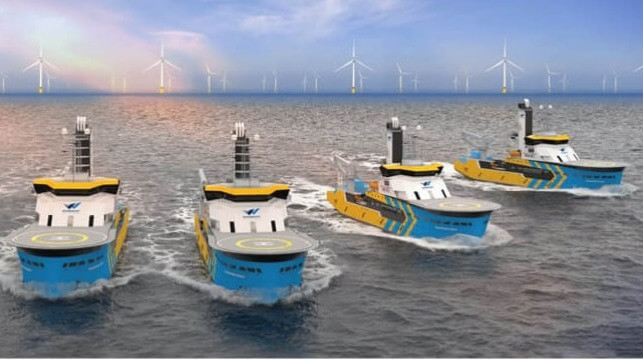CMB.TECH Doubles Down on Hydrogen Expanding CSOV Order with Damen

Belgium’s Saverys family continues to push forward aggressively with its vision of expanding the use of hydrogen as the emerging future fuel for the shipping industry. Through their CMB.TECH they have developed hydrogen propulsion technologies including the first hydrogen-fueled crew transfer vessel and today they confirmed the expansion of an order with Damen for the first hydrogen dual-fuel Commissioning Service Operation Vessels (CSOV) for the offshore wind industry.
The order with Damen was first placed a year ago calling for two hydrogen CSOVs to be built using CMB.TECH’s dual fuel hydrogen technology. CMB.TECH said it would provide the same dual-fuel hydrogen technology for the vessels as was used on the Hydrocat, the CTV launched in July 2022. The Saverys have said they planned to add at least six more hydrogen-fueled CTVs by 2024 as well as their efforts to use the technology in other segments of shipping.
Windcat Offshore, a company launched by CMB (Compagnie Maritime Belge) in 2022 reports it is expanding its order to a total of five hydrogen dual-fuel CSOVs to be built by Damen at its Ha Long Shipyard in Vietnam. The first three vessels are currently under construction in Vietnam and will be delivered in 2025. The delivery of the two additional CSOVs is expected in Q2 and Q3 of 2026. Windcat also has an option for a sixth vessel.
“The decision to expand the CSOV fleet aligns with Windcat’s commitment to meeting the increasing demand for these vessels worldwide, and will give us further capacity and flexibility to support clients in the offshore industry,” said Willem van der Wel, Managing Director of Windcat.
The hydrogen-fueled Elevation Series CSOVs was designed by Damen Shipyards in cooperation with Windcat and CMB.TECH. According to the companies, like all CSOVs, it is meant to be able to stay offshore at a wind farm for an extended period of up to 30 days. It has the capacity to provide accommodations for the crew and technicians working at the wind farm as well as storing maintenance materials.

that matters most
Get the latest maritime news delivered to your inbox daily.
The Elevation Series CSOVs will be 87 meters (285 feet) long and 20 meters (66 feet) wide. They will be able to accommodate up to 120 people. Like all new CSOVs, the vessels will be equipped with a state-of-the-art gangway, a crane, and thrusters, but they will also incorporate new features including hybrid battery technology and offshore charging capability. The use of hydrogen will permit them to minimize the CO2 footprint of the vessel operations which they believe will be a compelling advantage in selling their services to wind farm operators.
Windcat was acquired in 2020 by CMB as part of the family’s shipping operations which range from bulkers to container vessels and chemical tankers, and as of last week, they took control of Euronav, a leading crude oil tanker operator. The acquisition of Windcat was an entry into the developing offshore market focused on wind farms with Windcat Workboats. They look to build on those opportunities with the new sister company Windcat Offshore which was established as a dedicated business focused on CSOV ownership and operations.
